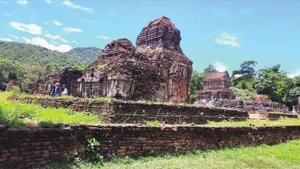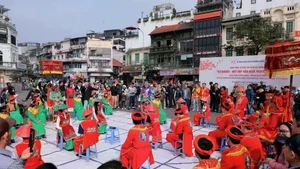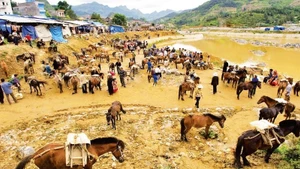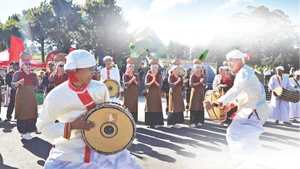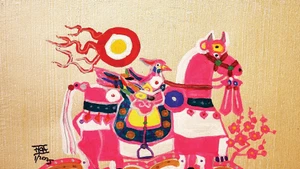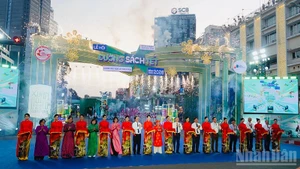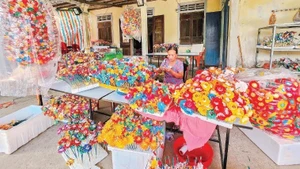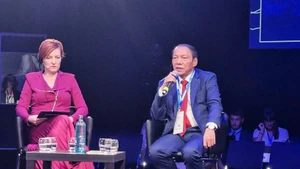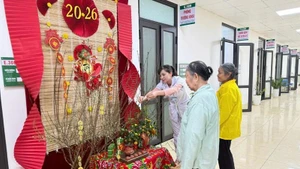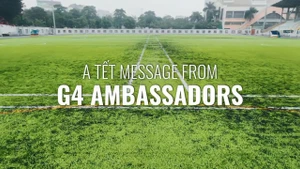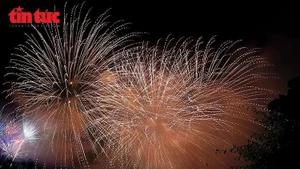Composing campaigns and writing competitions launched by the Ministry of National Defence and organisations and units have been held vibrantly and widely, opening up opportunities for young writers to approach and explore the depth of the revolutionary war theme with new perspectives, contributing to the preservation and dissemination of the nation’s fine traditional values.
Lack of large-scale works
The theme of the armed forces and revolutionary war was the mainstream of Vietnamese literature during the 1945–1975 period, and it remains an important source for preserving national memory, inspiring patriotism, and nurturing ideals of life for the younger generation. Within this flow, young writers are now facing many opportunities and challenges to show their role through professional contributions, while also addressing the limitations and urgent requirements of renewing their mindset and approaches.
The fact that young writers, both inside and outside the army, continue to choose this theme is a positive sign. Writers of the 1980s and 1990s generations such as Nguyen Minh Cuong, Dinh Phuong, Nguyen Quang Hung, Tong Phuoc Bao, Phat Duong, Phung Thi Huong Ly, Le Quang Trang, Ly Huu Luong, Nguyen Thi Kim Nhung, and Tran Viet Hoang… have pursued the theme seriously and won awards with works on the armed forces and revolutionary war. This is a positive signal because with the special features of the theme, there used to be a “lowland” for young writers due to the gap in time, experience, as well as changes in thinking and aesthetics.
However, many works still carry the nature of “writing competition”, hurriedly completed to meet competition deadlines and lacking the necessary incubation process. As a result, works often fall into being weak, lacking impact. Notably, a considerable number of young writers still use old, formulaic approaches, lacking multidimensional perspectives, which makes their works unable to “live” in the hearts of readers. In addition, many young authors only compose single works or small collections, avoiding challenging genres such as epics, novels, and long stories, thus lacking large-scale works with true ideological and artistic weight.
“The generation of talented writers and artists who lived through the war have been exhausted, while the following generations are limited in composing experience, awareness, and practical knowledge of war and the armed forces. Although there has not been a rupture in the theme, we can feel disappointed. Another challenge is that, however, this theme requires writers to be serious. Therefore, writers themselves must overcome themselves, through competition, to win over readers,” writer Nguyen Binh Phuong, Vice President of the Viet Nam Writers’ Association, shared about this issue.
Urgent requirements
Young writers need to define their roles and responsibilities through issues: dedication and experience; active renewal; linking composing with communication and dissemination process. Writing competitions, camps, and movement campaigns launched by organisations inside and outside the army have contributed to stimulating creativity, but many competitions still have shortcomings affecting quality and effectiveness. One of the reasons is organisation and judging team. The selection of jurors is based on administrative criteria or representativeness rather than expertise and deep knowledge of modern literature, leading to subjective evaluations and choosing safe works, making many young writers with good capacity not properly recognised, creating doubt and reducing motivation to pursue the theme.
Moreover, the organisation of competitions and programmes still follows old patterns: taking writers to visit and experience a few sites or historical relics, then asking them to complete a work in a short time. Many composing campaigns lack communication strategies, failing to create strong momentum in the young writing community. Some approaches remain administrative in nature, not truly encouraging free creativity or creating an open artistic space.
To turn the theme of the armed forces and revolutionary war into “living ground” for young writers to make breakthroughs, it needs changes in organisation, thinking, and dissemination. At competitions and writing camps, beyond “assigning tasks”, organisers should create opportunities for young writers to accompany the long term, supporting the development of works with depth in both thought and artistry. Greater investment in large-scale genres such as novels and epics should also be further focused. Expanding participants, diversifying approaches, and creating a link between writing, communication, and publishing are also key factors to spread the values of literature about the revolutionary war to the modern public.
“Writers have never before been so free to create. The realities of life and the spirit of the times are providing writers with an immensely rich source of data and inspiration. Exchanges and events with the participation of famous international writers also foster effective learning and interaction. Since 2021, the Viet Nam Writers’ Association has awarded the Young Author Prize, and among the winning works have been those on the armed forces and revolutionary war. Many authors who are also soldiers have been honoured. This sets both demands and expectations for breakthrough works,” noted Nguyen Quang Thieu, President of the Viet Nam Writers’ Association.
When competitions and writing camps are organised methodically, fairly, and professionally, and when young writers themselves are trusted, encouraged to dedicate themselves, and inspired with a strong aspiration, there will certainly be more large-scale and moving works that create lasting value for the nation’s literature.


